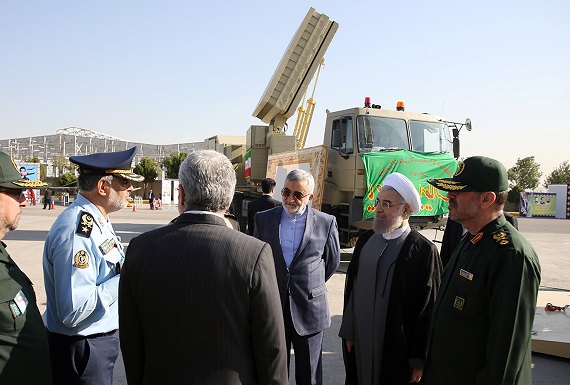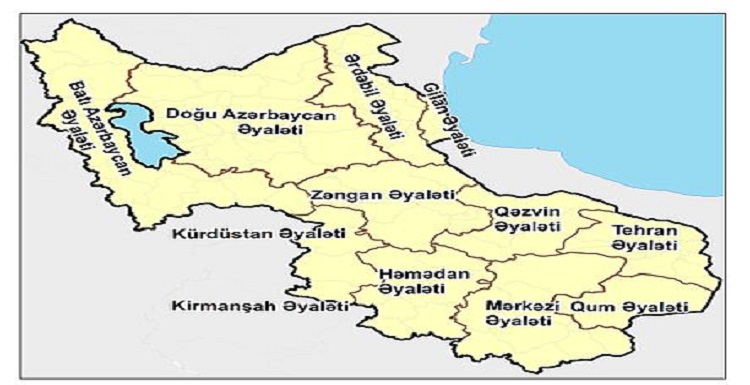WHILE IRANIAN ECONOMY CRASHES, ROUHANI BRAGS ABOUT FUNDING REGIONAL WAR, RAISING IRAN’S MISSILE PROGRAM BUDGET BY 80 PERCENT

Araz News: In a speech on Tuesday July 11, Iranian President Hassan Rouhani boasted that his government is propping up the Assad regime militarily and financially in Syria, and providing troops and militias in Iraq, as well as bragging that during his first term in office he increased Iran’s budget for its missile program by 80 percent compared to the expenditure of the previous Ahmadinejad administration; meanwhile with no apparent sense of irony, the president also reportedly blamed Western sanctions for the current economic crisis in Iran.
According to reports published in regime media, Rouhani told a gathering of senior regime officials that despite crippling Western sanctions on Iran, his administration has funded all the weapons being used by Syrian and Iraqi forces, as well as by Iran’s own troops and militias in the region, while also shoring up the Syrian economy and funding the Assad regime’s military requirements.
President Rouhani, praised by the former US President Barrack Obama as a “moderate” and “reformist”, dismissed reports of disagreements between himself and the Islamic Revolutionary Guards Corps (IRGC) on the country’s military expenditure, saying “We are working hard to develop the military industry in the country.” He added that Iran’s “enemies”, a reference to the US and Israel, are “terrified by our government’s funding of the Ministry of Defense.” The ‘reformist’ president further bragged that his administration “has worked at and will continue to develop the ballistic missile program,” adding that the government is focusing on supporting and funding the program, which he said “will be recorded in the annals of our government’s achievements .”
According to field studies, the Ministry of Roads and Urban Construction of Iran stated that 33 percent of Iranian people are living below the poverty line.
The July 12 report, published by “Tasnim” news agency , stated that the Ministry of Roads and Urban Construction expressed serious concern about these statistics showing how difficult living is for many in Iran.
The same report emphasized that in Iran, middle-class families would need to save at least one third of their monthly income for 96 years to even afford the purchase of their own home. The dream of buying a house in developed countries can become a reality for middle-class families after 14 years of saving of one third of their income.
A recent report by the Iranian Center for Statistics also stated that at least four tenths of the Iranian population lives in sheds or tents rather than built structures.
As public protests continue to grow across Iran at the spiralling economic crisis with more and more banks and credit institutions declaring bankruptcy and savers’ funds, often their life savings, being wiped out, Rouhani boasted that during his first term, the Iranian government has increased the budgetary ceiling for the regime’s missile program by 80 percent compared to the expenditure of his predecessor Mahmoud Ahmadinejad.
Under the recently reelected ‘reformist’ president Rouhani’s administration, Iran has attained the unenviable record of achieving the highest annual number of executions per capita globally, outdoing even China, in an effort to stifle domestic protest at increasing poverty and repression.
In this case, an Iranian economic expert has warned of the people’s reaction to the continued deterioration of the country’s economic situation. On July 8, 2017, Aftab newspaper published an article by renowned economic expert Mehdi Behkish on the deteriorating economic situation in Iran and the country’s complete lack of planning or programming to address the crisis.
Behkish stated that the economic situation in Iran has truly become a security and social threat to the country’s stability.
Behkish stated, “37 years have passed since the revolution and our economy is moving from bad to worse. All the scientific and field investigations conducted in this area indicate that there has been zero economic growth.” He continued by saying that all the natural resource related wealth of the country has been depleted and on the verge of running out – including the water resources which have deteriorated drastically without tangible progress being made to projects aimed at rejuvenating it.
Regarding economic solutions proposed by the Rouhani government, Behkish said, “The Rouhani government had linked improvement of the economic situation to reaching a nuclear agreement with the West. When those efforts faltered due to the arrival of a new US administration headed by Donald Trump, foreign investment companies fled from Iran, thus returning all progress to zero.”
Behkish warned, “There is no doubt that continued deterioration of the economic situation and the lack of employment opportunities for Iranian youth, especially the educated class and university graduates, will have serious social and security consequences, which could end in an uncontrollable revolution.”
Behkish feels that the sweeping protests that Iran is witnessing in different cities from unemployed workers and university graduates may be the ground from which an insurgency against the Iranian regime is born.
Scottish freelance writer and editor Ruth Riegler, who lived in the Middle East and writes about regional issues, told Vocal Europe that the economic crisis in Iran has been compounded by other strong emotive factors, such as the demands for justice by Ahwazi Arabs, Turks, Kurds, and Baluchis who are all suffering from large scale exclusion, discrimination, and denial of any national and cultural rights. These oppressed ethnic minorities now are demanding national autonomy along with right to self-determination due to continued racism, discrimination, violence, and oppression from the Iranian regime.
Riegler added since inside Iran is said to be an ethnically heterogeneous mosaic component the ethnic regions witness the most unrest and tensions, as frequent insurgencies and clashes between the armed ethnic movements and Iranian regime forces occur. This is due to armed resistance gaining popularity among the Kurdish, Ahwazi Arabs, and Baluchistan regions due to the continued oppression. Riegler also suggested that, if there were more coordination between the marginalized ethnic groups and the civil/labor/student movements in the Persian areas, then Iran could soon witness a real revolution to topple the regime.
She concluded that Iran’s expenditure of tens of billions of dollars on weapons and on domestic oppression and regional wars even while Iranians starve was a crime in itself. The Ahwazi Arab people and all the other minorities in Iran especially are being persecuted more brutally than ever by this monstrous regime, even while it steals their resources and slaughters people across the region. It’s ISIS with a bigger budget and an air force.
Meanwhile, Iran’s now-infamous nuclear deal of 2015 with the P5+1 group of nations, which was seen as a way to persuade Iran’s regime to abandon its nuclear weapons program has been leveraged to retrieve tens of billions of dollars which had been held under sanctions, with the regime using the monies to fund its missile program, pay regional militias, restock its weapons arsenals, and prop up the Assad regime in Syria with troops, militias, weapons and money.


























